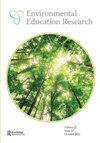When students write comedy scripts: humor as an experiential learning method in environmental education
IF 3.1
3区 教育学
Q1 EDUCATION & EDUCATIONAL RESEARCH
引用次数: 2
Abstract
Abstract Humor has received increasing attention in environmental educational research in recent years as it can have a variety of positive effects on learning atmosphere, outcomes, and student-educator relationships. In most cases, humor is used by educators while students act as consumers. However, this does not exploit the full potential of humor for environmental education. This article shows how humor can be applied as a distinct learning method and what outcomes and effects can be achieved. Our method draws on approaches from comedy-writing schools, thus bridging this community of practice to environmental education. It provides students with an understanding of the basics of humor, empowers them with practices to develop their own humorous texts, and guides them towards high-quality comedy scripts. We implemented several master courses at the Vienna University of Economics and Business based on this method. In 2021, we assessed the effects on students’ sustainability knowingness, attitudes, and behavior and analyzed qualitative outcomes. It was revealed that humor can play a pivotal role in environmental education as it fosters critical thinking and creativity, helps students cope with emotionally difficult topics, and supports them in becoming agents of change.当学生写喜剧剧本时:幽默是环境教育中的一种体验式学习方法
摘要近年来,幽默在环境教育研究中越来越受到关注,因为它可以对学习氛围、结果和学生与教育者的关系产生各种积极影响。在大多数情况下,幽默是由教育者使用的,而学生则充当消费者。然而,这并没有充分挖掘幽默在环境教育中的潜力。这篇文章展示了幽默如何作为一种独特的学习方法来应用,以及可以取得什么样的结果和效果。我们的方法借鉴了喜剧写作学校的方法,从而将这个实践社区与环境教育联系起来。它让学生了解幽默的基本知识,使他们能够练习开发自己的幽默文本,并引导他们走向高质量的喜剧剧本。基于这种方法,我们在维也纳经济与商业大学开设了几门硕士课程。2021年,我们评估了对学生可持续性知识、态度和行为的影响,并分析了定性结果。研究表明,幽默在环境教育中可以发挥关键作用,因为它可以培养批判性思维和创造力,帮助学生应对情绪困难的话题,并支持他们成为变革的推动者。
本文章由计算机程序翻译,如有差异,请以英文原文为准。
求助全文
约1分钟内获得全文
求助全文

 求助内容:
求助内容: 应助结果提醒方式:
应助结果提醒方式:


